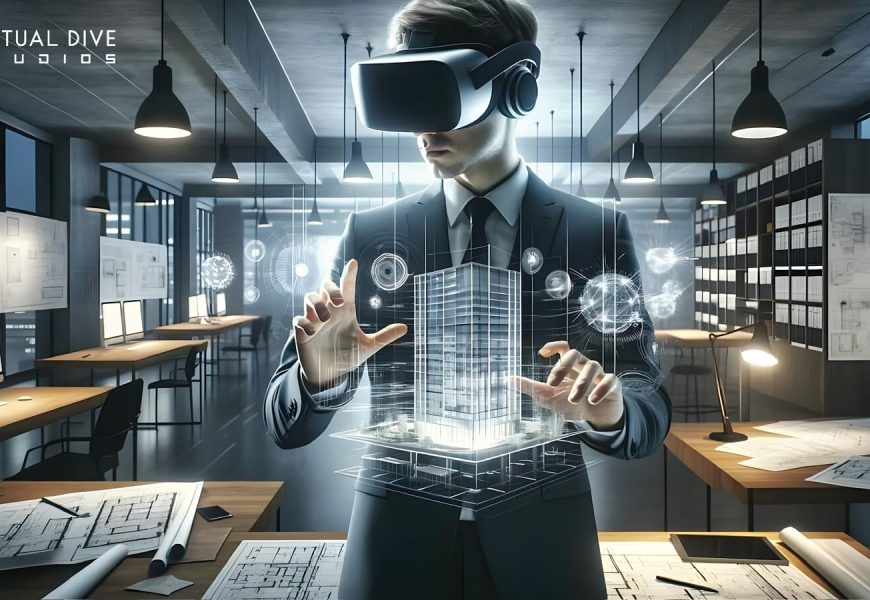Introduction
The gaming industry has undergone remarkable transformations over the past few decades. But none have been as ground-breaking as the advent of Augmented Reality (AR) and Virtual Reality (VR). These technologies have opened up new realms of possibility, offering immersive experiences that were once only dreamed of. As the demand for more interactive and engaging games increases. AR VR game development services have become a vital component in shaping the future of gaming.
In this article, we’ll explore how AR and VR are revolutionizing the gaming industry. The services available to game developers, and what the future holds for this exciting sector.
Understanding AR and VR in Gaming
Before diving into the specifics of AR/VR game development services. It’s essential to understand what AR and VR bring to the table.
Augmented Reality (AR) overlays digital elements onto the real world. This means that players can interact with both virtual and physical environments simultaneously. Popularized by games like Pokémon Go, AR in gaming blends the digital and physical worlds to create a unique interactive experience. In an AR game characters objects. Or information appear superimposed on the player’s environment through the camera of their device.
With the help of headsets like the Oculus Rift or HTC Vive. VR allows gamers to experience fully immersive worlds where they can interact with virtual objects and environments in real-time. This technology is often used for creating first-person experiences from action packed adventures to peaceful explorations.
The Role of AR and VR
AR and VR game development is a highly specialized field that combines art, technology, and storytelling. Developers need to master a range of tools and techniques to create these immersive worlds. This is where AR/VR game development services come in.
- Custom Game Development
One of the primary services offered by AR/VR game development companies is the creation of custom games tailored to specific needs or genres. Custom AR/VR game development ensures that the unique features and mechanics of the game are implemented correctly, making the gameplay seamless and engaging.
- Game Design and Prototyping
Creating a game that works well in AR or VR isn’t just about coding. The design process plays a critical role. AR/VR game development services often include game design and prototyping, where experts focus on gameplay mechanics, user experience (UX), and visual aesthetics. Whether it’s building character models or designing immersive environments, the prototyping phase ensures that the concept is both functional and engaging.
- Immersive Audio Design
Sound is a crucial component of any AR or VR game. The right audio design can enhance the immersive experience, making players feel like they’re really inside the game. Professional AR/VR game development services include sound design that complements the visuals and interactions. This can involve 3D spatial audio, dynamic music, or sound effects that change depending on the player’s actions and surroundings.
- Cross-Platform Integration
As gaming platforms continue to evolve, the demand for games that can be played across different devices is growing. AR/VR game development services often include cross-platform integration, enabling games to be accessible on multiple devices, such as smartphones, VR headsets, AR glasses, and gaming consoles. This flexibility not only increases the reach of the game but also allows developers to tailor their creations to the preferences of different audiences.
- AR/VR App Integration
In some cases, games may require integration with existing apps or platforms. AR/VR game development services often provide these integrations, ensuring that the game functions smoothly within the broader ecosystem.
- Testing and Optimization
Once the game is developed, it needs to be rigorously tested to ensure that it performs well on various devices and platforms. This involves checking for bugs, improving load times, and optimizing the user interface. AR/VR games are particularly sensitive to performance issues, such as latency or frame drops, which can break the immersion. Professional AR/VR game developers offer comprehensive testing services to identify and fix any potential problems before launch.
How AR and VR the Future of Gaming?
The future of gaming lies in the evolution of immersive technologies, and AR/VR is at the forefront of this transformation. Let’s look at how these technologies are shaping the gaming landscape and what’s in store for the future.
- Enhanced Immersion
AR and VR take gaming experiences beyond traditional screen-based interaction. The next generation of gamers expects more than just simple gameplay—they want to feel like they’re part of the world. VR, in particular, offers a 360-degree experience, where players can physically move and interact with the environment. Whether it’s exploring virtual worlds or engaging in realistic simulations, AR and VR are pushing the boundaries of immersion.
- Social Gaming
In AR, social elements can be incorporated through location-based experiences, allowing players to collaborate in the real world. These advancements are creating new possibilities for online gaming communities and social experiences.
- Educational and Training Simulations
In the future, AR/VR games could serve as powerful tools for learning, offering simulated environments for everything from history lessons to medical training. This could open up entirely new opportunities for gamification in education, where students and trainees can interact with virtual elements to improve their skills in a safe, controlled environment.
- Real-World Integration
One of the most exciting possibilities for the future of AR is its ability to integrate real-world elements directly into the gameplay. For instance, AR games could utilize advanced mapping technologies to create more complex, engaging scavenger hunts or puzzle-solving experiences.
- The Role of AI and Machine Learning
Artificial Intelligence (AI) and machine learning are becoming key components of the AR/VR gaming experience. These technologies can enhance gameplay by adapting the game environment to the player’s actions, creating a personalized experience.
Conclusion: The Future is Now
As the gaming industry continues to embrace AR and VR, the possibilities for creating innovative, immersive experiences are endless. AR/VR game development services are essential for bringing these experiences to life, offering customized solutions that enhance the gaming journey.
to tap into this growing market, the time to invest in AR/VR game development services is now.









